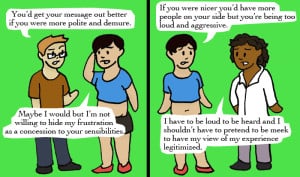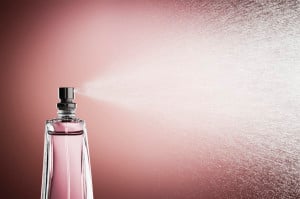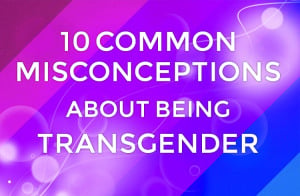
A person wearing colorful jewelry and round sunglasses beams at the camera while holding their sunglasses on their face. They stand against a deep blue backdrop.
“Are you serious?”
I blinked twice at my brother and cocked my head to the right, brows furrowed in confusion as to why he was challenging such an innocuous request.
We were at our parents’ house in southern Maine, wiling away our time before we had to leave for a family wedding that evening. Our mother was about to hop over to the drug store for some last-minute necessities, and she casually asked us if we needed anything while she was out.
“Can you pick me up some eyelashes?” I asked, referring to the glue-on kind that you use to enhance the length or thickness of your own goddess-given ones. And then everyone paused, looked at one another, and then looked at me.
“Really?” my mom asked in earnest, squinting as if I had suddenly blurred before her eyes into someone she couldn’t recognize.
“How do you reconcile that with your feminism?” my brother asked. “How do you champion the idea of ‘be yourself,’ but also wear fake lashes?”
I tossed a quick retort over my shoulder as I got up to leave the room: “Maybe you should leave feminism to the feminist.” But I’d be lying if I said that this wasn’t a constant question on people’s minds: How can you wear makeup and still be a feminist?
And I get where the confusion comes from.
After all, isn’t makeup a tool of the patriarchy to keep us so obsessed with narrow beauty standards that we can’t focus on revolution? And isn’t it a little frivolous and ridiculous of a hobby to find enjoyment in something so decidedly feminine? And how can one proclaim themselves anti-capitalist if they throw money toward thirty-dollar tubes of lipstick (even if they do come in names like Anarchy and Rebel)?
Indeed, the makeup-wearing feminist feels like an oxymoron.
But I think maybe that’s only true for the folks who still hold onto the myth that bra-burning was a thing that ever happened.
Because makeup and feminism aren’t on opposite ends of some spectrum of superficial-to-enlightened. And although there’s a lot to question about the role that makeup plays in our lives, the “Isn’t it inherently anti-feminist?” one isn’t really worthwhile to ponder.
Because, in truth, it’s the pressure for women (in particular) to wear makeup that’s the problem – not the fact that it exists as an option.
So for those who are still confused about how we can reconcile our feminism with our love for winged eyeliner – or for the fellow woman who once said that she had a hard time taking my talk of liberation seriously because the mouth that formed those words was coated in a lavender-violet hue – here’s your answer.
1. Feminism Is About Honoring Bodily Autonomy
If you ask me, there’s nothing that goes against feminist values more than questioning whether or not what a person adorns their body with is “appropriate” – regardless of the scale being used to ascertain that value.
Because whether we’re talking about tattoos, short skirts, tank tops, or lipstick, the idea is the same: We get to choose our own modes of self-expression. And neither patriarchy nor feminism gets to have a one-size-fits-all say in that.
And that isn’t to say that by virtue of making a choice, that that choice is feminist. I’ll be covering that more thoroughly in point #2. What I am saying is that before we jump to the question of whether or not a person is critically analyzing their choices (and how those choices affect us on a larger scale), we need to agree that whatever a person decides to do with their body is up to them (and keep your devil’s advocate hypothetical straw man arguments against that statement to yourself, please).
Various oppressive systems – from patriarchy to white supremacy to capitalism and beyond – have had a say in what it means to present ourselves “respectfully” for centuries. The last thing that we need is for our antidote movements to replicate those same hierarchies.
Especially as a marginalized person, I don’t always have a lot of power or control over my world or my life. But the one thing that I can feel empowered in is the idea that no one but me gets to decide what happens to my body.
And that very idea – that this is my body, and not yours, and not patriarchy’s, and not feminism’s – has to be a core value in our liberation work. Because as soon as you start believing that your dogma can dictate how a person lives in their body, you’re actually doing the patriarchy’s work for it.
We don’t need more people telling marginalized bodies how they’re allowed to be seen, regardless of what it’s “in the name” of. We need more people to honor bodily autonomy – and that includes the right to rock a fierce manicure if we want to.
2. Feminism Is About Critically Analyzing Our Choices
The problem with being a feminist is that every single choice that you make is riddled with questions about whether or not that choice is helpful or harmful, overall, to liberation.
Like, I fucking love Taylor Swift, but when she sings about competitive girl hate or makes racist-as-hell music videos, am I still allowed to jam? Or by giving her money and fandom, am I upholding the very structures that I’m trying to crumble? How does my individual choice to dance around my house singing “We Are Never, Ever Getting Back Together” play a role in the cultural subjugation of women?
And so, I need to take time to critically analyze why I like Taylor Swift and how I’ll engage with her content. For me, that means that I invest in calling out what’s problematic about her in a way that I can only do as a fan. I have an entire section of my presentation on how mainstream media glorifies dating violence dedicated just to the “Blank Space” music video, FFS.
Basically, being a feminist means that you never get to enjoy a damn thing unconditionally, because there. are. always. conditions. And makeup is no exception. Fun as it is, and innocent as it can seem, we definitely need to analyze that choice before we make it.
Because as easy as it is to say that any choice that we make as marginalized people is automatically feminist (because look! I’m making a decision for myself in a world that tries to make decisions for me!), the truth is that we don’t make choices in a vacuum.
What that means for me is that while I authentically enjoy makeup, I also have to recognize that it’s impossible to know if I would still like it if I hadn’t been socialized to believe that I had to. It means understanding that the choices that I make are dependent on the choices that are offered to me.
So while I’m empowered to decide that I want to wear makeup, I’m equally disempowered by a system that sells that to me as the “right” choice to make. And the fact that I refuse to leave the house without makeup? That’s definitely the result of internalized misogyny. And feminism taught me that.
But recognizing the ways in which things are problematic – and, um, just about everything is problematic in some sense – doesn’t mean that we have to entirely distance ourselves from them.
It just means that we need to be cognizant of them, talk to other people about them, and constantly reevaluate what it means for us to partake in them – both for ourselves and for society-at-large.
3. Feminism Is About Not Demonizing Femininity
There’s this (bullshit) idea out there that the only way to be a “good” feminist, as women, is to distance ourselves from all things associated with hegemonic femininity: No more bras, no more hair curlers, no more razors, no more long hair, and no more nail polish.
Only when we wash our hands of all things pink and frilly and pretty can we really call ourselves feminists. Because in order to be feminists, we need to push ourselves away from what society considers “womanly” and position our existences as more androgynous than anything. But the problem with our social concept of androgyny is that it’s—well—pretty masculine. And I don’t see how considering masculinity more valuable than femininity is feminist at all.
Your (a)gender identity, gender presentation, and adherence (or not) to gender roles is entirely up to you. Freedom from patriarchy means not believing in the boxes that are so often used to suffocate us – and to move toward a self that is free of gender expectations. But that means that what we traditionally consider “feminine” is still up for grabs.
Being free of gender expectations doesn’t mean that you’re relegated only to expressions of gender that are outside of what you’ve been coerced under since birth. It means that you can actively choose to engage in that expression of gender, too.
It also means allowing the association of makeup with women to implode. To turn to dust. To be blown away into the cosmos, never to return. Because people of all (a)gender identities can (and do) use makeup.
Makeup doesn’t have to be a gendered thing. And when you shame women, in particular, for using makeup, what you’re suggesting is 1) that makeup, as a “feminine” pursuit, is inherently associated with women only and 2) that makeup, as a “feminine” pursuit, should be put down.
But your assertion that femininity itself is wrong simply echoes the patriarchy. Telling women that if they want to be “good” feminists, they need to dissociate from what is traditionally considered feminine only helps to solidify those things as territory solely for women – and to strengthen the idea that anything associated with femininity is less-than.
Women, just like everyone else, are allowed to choose a gender expression that feels good to them – and so long as “feminine” is an option, we’re allowed to choose that one.
***
So, I get it. There are a lot of (really great) arguments for why women using makeup doesn’t jive with feminism and why feminists should throw out (or burn) every physical tool used to oppress us.
But I think that there are a lot of (really great) arguments for why telling women what to do with their bodies – yes, even in the name of feminism – is just as harmful. Because at the root, it’s the exact same issue. So yes, brother, I can reconcile my feminism with my want for falsies just fine, thanks.
Because I think that the most feminist thing that we can do is to join forces to tear down the notion that marginalized people need to be told what to do with their bodies – and to accept that while some of us are going to show up to the revolution fresh-faced, others are going to need a really good setting spray for battle.
[do_widget id=’text-101′]
Melissa A. Fabello, Managing Editor of Everyday Feminism, is a body acceptance activist and sexuality scholar living in Philadelphia. She enjoys rainy days, tattoos, yin yoga, and Jurassic Park. She holds a B.S. in English Education from Boston University and an M.Ed. in Human Sexuality from Widener University. She is currently working on her PhD. She can be reached on Twitter @fyeahmfabello.
Search our 3000+ articles!
Read our articles about:
Our online racial justice training
Used by hundreds of universities, non-profits, and businesses.
Click to learn more
Most Read Articles
- « Previous
- 1
- …
- 30
- 31
- 32



















